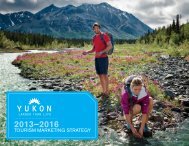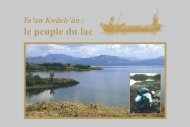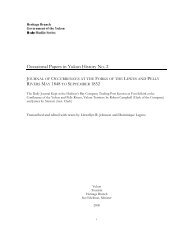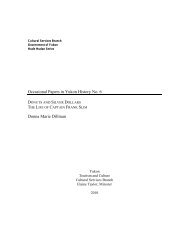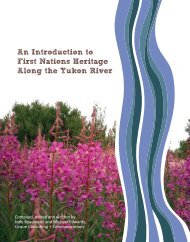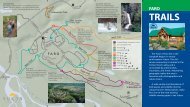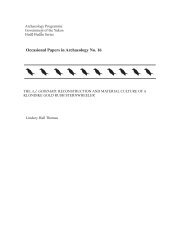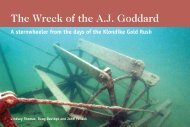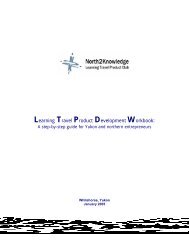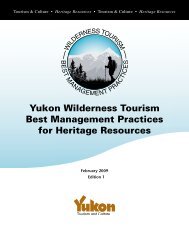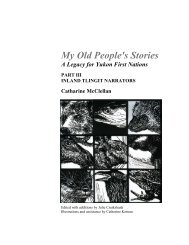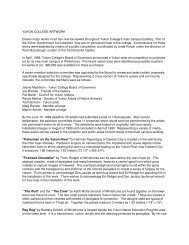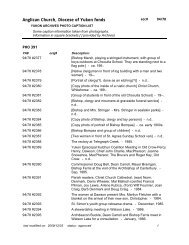Sustainable Tourism: The Tour Operators' Contribution
Sustainable Tourism: The Tour Operators' Contribution
Sustainable Tourism: The Tour Operators' Contribution
You also want an ePaper? Increase the reach of your titles
YUMPU automatically turns print PDFs into web optimized ePapers that Google loves.
4. Product Management and Development<br />
To minimise paper work, Discovery Initiatives offers to discuss ideas and questions with potential proponents<br />
before they prepare a full proposal. Based on this informal exchange, proponents are then asked to fill in<br />
a proposal based on a pre-defined outline and submit it, along with relevant material, literature and photos.<br />
On receiving the summary, Discovery Initiatives looks at its potential for inclusion in its programme, and, if<br />
suitable, a more detailed discussion and investigation will be entered into with the project proponent. Once<br />
a decision has been made to include an organisation, tour or proposal in Discovery Initiatives’ programme it<br />
may be necessary for a Discovery represen-<br />
tative to carry out a detailed reconnaissance of<br />
the area before it is placed in the brochure.<br />
Proposals for all three types of holidays should<br />
highlight:<br />
• <strong>The</strong> unique feature of the programme (the<br />
‘eye-catcher’);<br />
• A description the benefits of the proposal in<br />
terms of :<br />
- Planning the programme or itinerary so<br />
that it aids cultural understanding and<br />
interaction;<br />
- Ensuring the permission, support and<br />
participation of the local communities,<br />
recognising that theirs must be a quality<br />
experience as much as our own;<br />
- Avoiding any actions that offend our<br />
hosts or disrupt their livelihoods;<br />
- Using local services, resources and<br />
expertise wherever possible, to support<br />
local trading enterprises;<br />
- Ensuring the highest standards of<br />
environmental stewardship both in the<br />
field and en route; and<br />
- Ensuring that participants are wellbriefed<br />
and prepared, and are able to<br />
have a well-informed, enlightening and<br />
enjoyable experience.<br />
For Footprint or Insight Holiday programmes,<br />
applicants should also highlight a detailed<br />
itinerary, fitness requirements, names and<br />
expertise of tour leaders, programme costs and<br />
minimum persons required.<br />
For Discoverer Holidays, proponents should include information about project personnel, timing, local<br />
ecosystems, research objectives and methodology, project justification, expected programme outputs, lists of<br />
required tasks and useful skills, fitness requirements, funding and costs. Proposals for Discoverer Holidays<br />
projects are reviewed according to specific criteria (see Box 1), and research projects are discussed with<br />
external experts and referees. All research proposals are subject to scrutiny with regards to their marketability,<br />
participant tasks, logistic feasibility and output.<br />
Implementation<br />
Because of the uniqueness of Discovery Initiatives’ holiday programmes, communication with customers is a<br />
priority. Customers are informed about the projects at various stages of their holiday, including:<br />
<strong>Sustainable</strong> <strong><strong>Tour</strong>ism</strong>: <strong>The</strong> <strong>Tour</strong> Operators’ <strong>Contribution</strong><br />
BOX 1: Project Criteria for<br />
Discoverer Holidays<br />
Any proposed Discoverer Holiday should:<br />
• Promote viewing, understanding, management and<br />
preservation of threatened habitats and endangered<br />
species on land and sea. <strong>The</strong>se include monitoring,<br />
behavioural studies and protection of wild population.<br />
• Contribute to sustainable development by producing<br />
measurable results (for example by engaging in<br />
activities such as community forestry, alternative<br />
energy and environmentally sound technologies).<br />
• Concentrate on the preservation of ethnic diversity<br />
and culture (such as anthropological studies, recording<br />
traditional knowledge, cultural change, ethonobotany).<br />
• Seek to raise awareness of the effects of deforestation,<br />
ozone depletion and pollution of all forms.<br />
In addition, the projects should have the following characteristics:<br />
• Take an interdisciplinary approach;<br />
• Foster partnership between NGOs, institutes and local<br />
communities;<br />
• Focus in particular on developing countries and<br />
countries in transition;<br />
• Have full backing of the supporting organisation;<br />
• Have marketability to attract individual and corporate<br />
participation;<br />
• Encourage sustainability at the end of the project’s life;<br />
• Enhance employment opportunities locally,<br />
• Complement and not supplement conservation efforts;<br />
• Have specific and quantifiable outputs or actions;<br />
• Require partnership in terms of funding or expertise.<br />
• Have a duration from one month to five years; and<br />
• Be revised on an annual basis.



